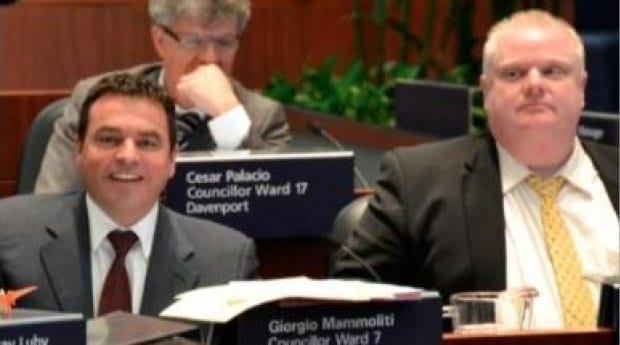Toronto Mayor Rob Ford twice trod on the toes of the LGBT community at city council July 9.
First, Ford refused to stand to recognize the work of city and Pride Toronto staff on WorldPride 2014, which ended a day before he returned to office after a two-month stay in the GreenStone rehab facility in Muskoka for drug and alcohol problems.
He also delayed the vote on a report on developing supports for LGBT youth in homeless shelters, rather than allowing it to go ahead. The report has been in development since December 2013 with the aim of researching the feasibility of a homeless shelter specifically for LGBT youth. It passed through committee during WorldPride week.
Because Ford held the report, council will now likely debate its recommendations before a motion can be passed.
Ford, who scrummed briefly with reporters on his way to the afternoon session of city council, refused to answer questions about why he held the report on LGBT shelters, while insisting that he is not homophobic. “You guys have asked me this question for 14 years and you know the answer,” he said.
His brother, Councillor Doug Ford, says the mayor will address all constituents’ needs, regardless of sexual orientation. The mayor also has gay people on his campaign team, he added. However, both Fords have been tightlipped about who specifically sits on the mayor’s campaign staff.
Ward 27 Councillor Kristyn Wong-Tam doesn’t mince words when asked to describe Ford’s attitude toward Toronto’s LGBT community.
“It was shameful,” she says of Ford’s decision not to stand in support of staff who worked on WorldPride. “It was very much in line with his small-minded, small-hearted attitude towards this community.”
Tanya Gulliver-Garcia, a research coordinator at the Canadian Observatory on Homelessness/Homeless Hub who also sat on the committee that developed the report on LGBT youth in homeless shelters, is also disappointed that Ford chose to hold the report instead of allowing it to go vote. “This really should be something that should be obvious,” she says, noting that the recommendations would have no significant impact on city finances.
Studies have found that 25 to 40 percent of homeless youth identify as members of the LGBT community, far more than are found in the general population of homeless people. Dr I Alex Abramovich, a research coordinator at the Centre for Research on Inner City Health, told Xtra in December that there are several problems that make Toronto shelters unsafe or inaccessible for LGBT youth, including paperwork that requires youth to choose a gender identity.
“It is extremely unfortunate that [Ford] has decided to hold the motion at a time when we cannot afford to wait any longer and when it is crucial that the city respond to this emergency situation,” Abramovich tells Xtra.
The report recommends that the city investigate the feasibility of allocating 25 percent of beds at an existing shelter to LGBT youth and look into community organizations that could potentially run a dedicated LGBT youth shelter. The report also recommends that all shelter staff undergo mandatory anti-homophobia and anti-transphobia training.
It will go to vote either today, July 9, or later on July 10, according to Wong-Tam.


 Why you can trust Xtra
Why you can trust Xtra


